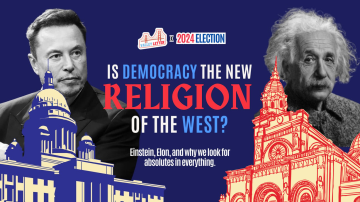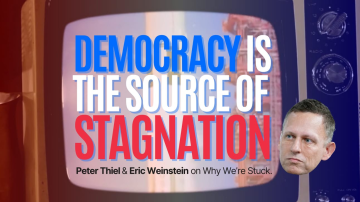Why doubling down on identity politics might cost them the election
In the run-up to the 2024 election, we’re doing things a little differently here at Valley Letter. For the six weeks leading up to the election, we’ll be diving into the political scene in Silicon Valley, exploring everything from alternative systems of government to specific policy pitches from the likes of Peter Thiel, Sam Altman, and Ben Horowitz.
In a disillusioning two-party system, expand your mind with these bold ideas that cross party lines and question everything we think we know about politics in America.
When you look at the last four Democrat nominees for President, one stands out as unavoidably different from the others. But it’s not the one you think.

Joe Biden is the only recent nominee who doesn’t belong to a minoritized gender or ethnic background. Overall, the party has been trending towards more diverse candidates since Obama, inspired by his success.
But Biden isn’t the anomaly. Obama is.
President Obama is unique in this lineup not because of his background, but because of his abilities. Obama is a phenomenal orator. His three successors are not.
Yet, Obama is remembered as the first Black President first and a great orator second. And that simple case of survivorship bias is dooming the party.
Let’s backtrack a little.
In World War II, statistician Abraham Wald coined the term “survivorship bias” when he assisted the armed forces with the Statistical Research Group (SRG) at Columbia University. While the instinct was to reinforce planes in the areas with the most bullet holes upon their return, Wald pointed out that planes shot in those regions were able to return to base. Evidently, it was the planes that were shot elsewhere that did not survive.

Survivorship bias has also been applied to business. Nassim Taleb berates how we celebrate the very few who succeed by, for example, dropping out of college, while ignoring the huge number of failures. As Alec Liu wrote for Vice, “for every Mark Zuckerberg, there’s thousands of also-rans, who had parties no one ever attended, obsolete before we ever knew they existed.”
That’s because, as author David McRaney observes, the “advice business is a monopoly run by survivors. When something becomes a non-survivor, it is either completely eliminated, or whatever voice it has is muted to zero.” Basically, we stop listening to people when they fail.
In politics, we can see “survivors” as the folks who are elected, and “failures” as those who aren’t. Survivorship bias comes into play because a party’s choice of nominee is a highly calculated, strategic decision, based on assumptions about the voter base and extrapolations from past successes. That’s where the Obama fallacy comes in.
The Obama Fallacy
The reason President Obama is remembered as the first Black President before any other trait is partly the fault of the availability heuristic, a kind of mental shortcut that operates on the idea that, if something can be easily recalled, it must be important. It creates a bias towards new information or information that has been repeated many times – such as the “first Black President” factoid.

That’s not to say that the election of President Obama was not historic or important. But, simply due to how often it is mentioned, his ethnic background supplants all other information in your mind, including his accomplishments and his skill as an orator, to become the foundation on which his success must be based.
Democrats fell for the Obama fallacy in droves. They counted on the idea of a historic presidency to get Hillary Clinton elected, and are in the process of doing the same with Kamala Harris. When Clinton lost to a white male candidate with no political experience, alarm bells should have sounded for Democrats: experience, whether personal or professional, doesn’t win elections.
The problem – much like the candidates’ actual merit – is not tied to their gender or ethnic background. The real problem is far simpler: they are poor orators.
The Oration Factor
Kamala Harris’s speaking style has been criticized by people on both sides of the aisle, from her “annoying” laugh to her supposed “word salad”. In 2016, a Vox article headline began, “Hillary Clinton is bad at speeches”. So why does oration matter so much when picking a president, and why do Democrats keep choosing bad speakers?
AP journalist Dan Perry answers the first question simply. “Charisma lowers the burden of proof and turbocharges the message.” Good oration is a kind of self-validation, forging an emotional connection that builds trust with an audience.
There’s no one type of good speaker. Trump is a good orator despite his lack of eloquence, because he builds an emotional connection with his audience. Obama’s speaking style is authoritative and eloquent, with a dash of humanizing humor.
Presidents throughout history have demonstrated other styles, from JFK’s masterful storytelling to Lincoln’s concise candidness, but all have been successful orators.
Time and time again, Americans elect candidates who they feel an emotional connection to. Professor Drew Westen explains this in The Political Brain:
“If you think the failure to tell a coherent story, or to illustrate your words with evocative images, is just the “window dressing” of a campaign and makes little difference in the
success or failure of a candidacy, you’re missing something very important about the political brain. Political persuasion is about networks and narratives … The political brain is an emotional brain.”
If Harris loses in November, it will likely become one of a growing number of failures for the Democrats that is simply swept under the rug, with the Obama fallacy kept as the party’s North Star. And as long as they continue to choose candidates based on identity politics over oration, they are doomed for many more.









Hey guys, I just found bajilogin and it seems pretty interesting. Gonna give it a shot and see what’s up. Check it out here: bajilogin
Interesting read! The focus on a secure, regulated platform like PH 799 is key for Filipino players. Rapid transactions sound great-check out the ph799 app download for a streamlined experience & diverse ph 799 games! 👍
777betcasino… That’s the ticket! If you are looking for a new online casino, I highly recommend it. This platform has awesome bonuses! 777betcasino
Honestly, Jlsir surprised me. I wasn’t expecting much, but the site is well-designed and the customer service was actually pretty good. Worth a look to play here: jlsir.